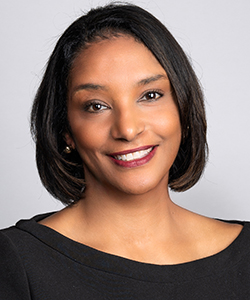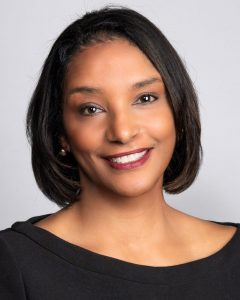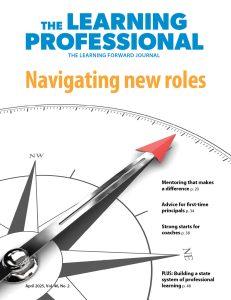From the editor: This post is the first in a series on nontraditional career paths for those working in educator professional learning. We asked Nikki Mouton to share her professional journey from a science teacher in Georgia to Senior District Fellow with Learning Forward. Future posts will explore how other educators are leveraging their knowledge and skills in professional learning to find success in alternative career paths.
I started my career as a science teacher for Bibb County (GA) Public Schools, teaching at the same high school I attended as a student. During these years teaching high school and middle school, I was afforded the opportunity to serve more students by working with teachers as a district-level instructional coach. While in this role, I joined a cohort for professional developers and was introduced to Learning Forward, called NSDC at the time. I began learning all the different aspects of being an instructional coach, including adult learning theory and how to focus on meeting the needs of students and teachers. It was here that I realized there was a whole world in public education outside of the typical principal, counselor, or teacher career pathways – there were people who spent their time trying to help teachers improve their craft.
During those early years, I worked with a group of individuals who were tied to Learning Forward. They talked about being graduates of the Learning Forward Academy like it was the Masters event for golf enthusiasts or like Harvard for attorneys. I then had the good fortune to go to Learning Forward’s annual conference for the first time. What an eye opener that was for me. As a science teacher, I had attended other conferences, but no place outside of the university did I find learning that poured into my growth and development like the annual conference. The entire time, I was asking myself, how can I affect change at the same level in my own sphere?
From instructional coach to curriculum director
Not long after that, a science director position opened up and someone suggested I apply. I felt honored but unprepared. I thought, there is no way I can fit into those shoes. I’ve not completed other traditional steps that people usually go through to prepare for this type of position. However, I put my name in the hat with all of the other well-qualified applicants, thinking that at least it would be a learning experience if nothing else.
It turns out that the district valued the skills I had started building related to professional learning theory, adult learning theory, curriculum and instruction, and professional learning’s impact on student achievement. These skills were already undergirding all of my work, and I got the job.
I went from instructional coach to science curriculum director, responsible for all things K-12 science. The skill set I needed for that job was different than the skill set that one might need to be a principal. I wasn’t managing people or a building, but I had leadership responsibilities. I had no team, just an assistant and 12,000 teachers in our district. I had to be able to forge relationships with internal and external stakeholders, be it teachers, senior-level district leaders, principals, vendors, parents, or board members.

Climbing the jungle gym of success
After four or five years, I had started several initiatives and had been through several cycles of adoption, trainings, workshops for new teachers, parent involvement, writing curriculum, and evaluations. I started to think about next steps. In conversations with mentors, they all advised that to move up, I needed to be a school-level leader in the traditional ladder progression. As a director, I was already equal to principals in salary, so listening to that advice would have kept me stagnant and looking for another step up soon enough.
Finally, one mentor suggested that my career path might look more like the latticed framework of a jungle gym rather than a ladder. I just needed to imagine traversing the climb to the top using the wider variety of knowledge and skills I had been able to attain thus far. My entire career had been a quest for learning about leadership, so school-level leadership skills, while beneficial and adding to credibility, were not the only ones of value.
From curriculum director to executive director
I soon heard that an executive director of staff development position was available. I had been affiliated with the work of Learning Forward, leading professional learning with teachers, and working as a school consultant. I thought, surely this was the job for me.
During the interview, the first question they asked me was, given that I was not a school-level leader, what prepared me for this position? I think answering that question is where I landed the job. I was able to share with them where my experiences were aligned. Unlike someone who had been in just one school building, I had managed a multimillion-dollar budget. I worked alongside numerous other professionals in education and could speak about how experience with boards and community members, developing relationships with multiple stakeholders, and increasing leadership capacity are all necessary to have success in a high-level central office position. Not everyone gets a chance to learn those while staying in one building. That’s how I became executive director of staff development for the largest district in Georgia.
In the beginning, we needed to completely revamp how that whole department worked, and we only had three people in my department to lead professional learning. To help tackle some of our challenges, I joined Learning Forward’s Academy. The people on my Learning Forward Academy team became my thinking partners and go-to advisors as I was trying to learn the job. They became my growth partners and we are still friends. During these years, my department shifted from thinking of staff development in terms of seat time and instead started thinking about it in terms of changing practice. I would later be asked to return to the Academy as a coach leading a cohort a few years later.
Not long after that, an executive director of curriculum and instruction position became available. Once again, I thought, why not me? In the interview, they asked me what I needed to be successful in that position. I told them that I wanted to remain connected to the professional learning team by having them join forces with the curriculum team to create a true partnership.
I continued to use my leadership skills and knowledge of professional learning to move through other positions, until I decided to join Learning Forward to work with leaders from all over the country to affect change for even more students.
Lessons learned
Despite what many told me, I didn’t have to get school-level leadership experience to move up. I had vision, knowledge of continuous improvements cycles, team leadership experience, and the ability to galvanize others and join forces to reach a goal. Much of the focus of my employers was on what they want a position to accomplish, what skills and knowledge are needed to achieve those goals, and not on which rungs of the ladder I had stepped on.
I would encourage others who are considering how they can move up in their career to focus more on their assets and less on what traditional paths have been. What are your aspirations, goals, talents, and skills that you bring to the table, and how can you leverage those to meet the needs of the organization? ''I would encourage others who are considering how they can move up in their career to focus more on their assets and less on what traditional paths have been.'' @mouton391 Share on X
Think of your career goals as stretch goals. There is no one way to do this work. Just because a recipe has worked in the past, doesn’t mean it will continue. Have your own personal growth plan. Figure out how new skills or and knowledge will help you prepare for your future, and don’t wait for opportunities to come to you – seek them out instead. Treat every day at a job as if you are on an interview. Impress the people around you with your work ethic, dedication, commitment, and drive. Connect with different people at different levels. Never limit yourself!






